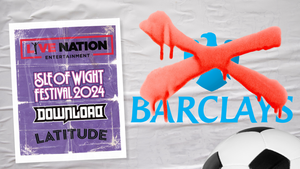Barclays has suspended its sponsorship of Live Nation’s UK festivals this summer, including Download, Latitude and the Isle Of Wight Festival. It follows a high profile campaign against that sponsorship - which led to many artists pulling out of Live Nation’s events - in protest at the bank providing financial services to defence companies that have supplied weapons to Israel.
In a short statement, Live Nation said, “Following discussion with artists, we have agreed with Barclays that they will step back from sponsorship of our festivals”.
A spokesperson for Barclays itself told The Guardian, “Barclays was asked and has agreed to suspend participation in the remaining Live Nation festivals in 2024. Barclays customers who hold tickets to these festivals are not affected and their tickets remain valid”.
The bank entered into a five year brand partnership deal with Live Nation’s UK festivals division last year. The involvement of Barclays in music events has caused a little controversy in the past because of its investment in fossil fuels. However, this year the controversy surged because of the situation in Gaza and the bank’s investments in the arms industry.
A group of artists and music fans began to protest over the involvement of Barclays in Live Nation’s events, calling on and pressuring other artists to refuse to play at them.
The Great Escape was the first event to see the impact of that campaign, with more than 100 acts who had been booked to play ultimately pulling out of the Brighton showcase festival. It then became clear that all of Live Nation’s other summer festivals, including this weekend's Download, would also have to contend with protests, boycotts and acts pulling out.
Although Barclays will no longer have a presence at Live Nation’s events, it is thought that some other elements of the five year deal will stay in place. Nevertheless, the protest group Bands Boycott Barclays say that today’s announcement is a “victory” for its campaign.
"As musicians, we were horrified that our music festivals were partnered with Barclays, who are complicit in the genocide in Gaza through investment, loans and underwriting of arms companies supplying the Israeli military. Hundreds of artists have taken action this summer to make it clear that this is morally reprehensible, and we are glad we have been heard”.
“Our demand to Barclays is simple: divest from the genocide or face further boycotts”, they add. "Boycotting Barclays, also Europe’s primary funder of fossil fuels, is the minimum we can do to call for change”.
The sponsorship of cultural events by companies with links to things like arms or fossil fuels has caused controversy in the past. However, the pressure on events to avoid such partnerships - and on performers to boycott events that do - has increased in recent years.
And the pressure is having an impact. Edinburgh-based investment firm Baillie Gifford recently ended its support of various literary festivals, including the Edinburgh International Book Festival, because of controversy over its investments in fossil fuel businesses.
While many may feel that these are positive developments, and that these companies should never have been involved in culture, many events and festivals rely heavily on sponsorship to be viable. As certain potential sponsors withdraw from music and culture - probably diverting their budgets to something like sport - some of those events may struggle to find alternative funding.
This is something Barclays claimed in its statement to The Guardian, saying, “The only thing that this small group of activists will achieve is to weaken essential support for cultural events enjoyed by millions. It is time that leaders across politics, business, academia and the arts stand united against this”.

